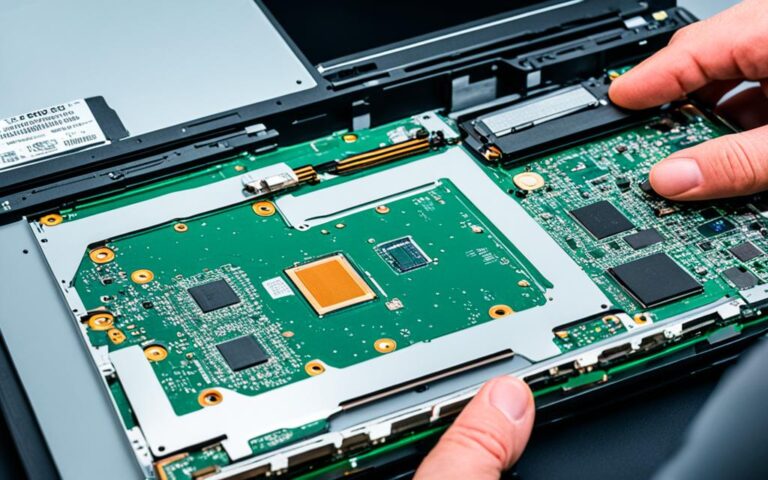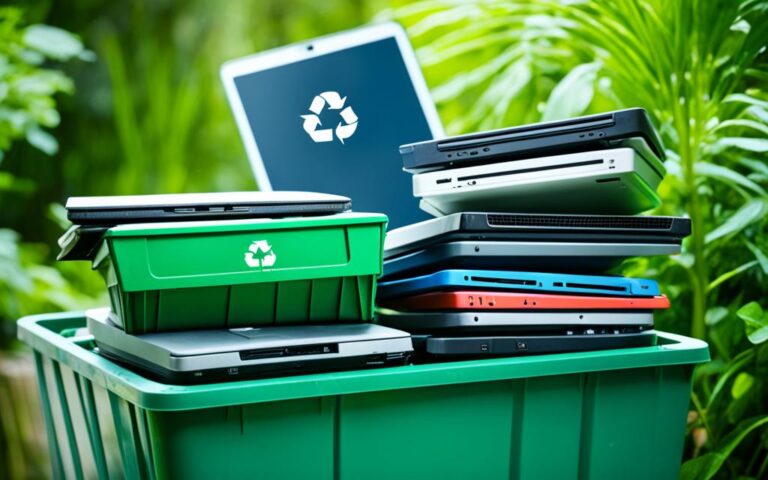The Importance of Proper Laptop Recycling in Healthcare IT
Proper laptop recycling is crucial in healthcare IT to protect patient data and preserve the environment. Companies need to be aware of the potential threats posed by old and discarded devices, including data breaches and privacy concerns. Healthcare professionals must have an effective data destruction plan in place to ensure the privacy of patients’ information.
Why Data Destruction is Important in Healthcare
Data destruction plays a critical role in the healthcare industry, especially considering the sensitivity of patient information. Protecting patient privacy is not only a legal obligation for healthcare providers, but it also establishes trust and safeguards their reputation. The consequences of compromised patient data can put individuals at risk and damage the credibility of healthcare organizations. Compliance with federal and state laws, such as the Health Insurance Portability and Accountability Act (HIPAA), is crucial, as these regulations mandate the destruction of protected health information to ensure patient safety and confidentiality.
Proper laptop recycling in healthcare IT brings a multitude of benefits. It not only helps reduce electronic waste but also contributes to the conservation of natural resources. By recycling computers, healthcare organizations play a vital role in supporting a circular economy and safeguarding the environment from the harmful effects of excessive e-waste in landfills. Additionally, proper laptop recycling can lead to significant cost savings for healthcare institutions, as it eliminates the need for expensive landfill fees and specialized electronic waste disposal services.
“Recycling computers in healthcare IT is not just about environmental sustainability; it’s also about responsible resource management and cost-effectiveness.”
Implementing a comprehensive laptop recycling program in healthcare IT not only demonstrates a commitment to environmental sustainability but also showcases a responsible approach to resource management. By embracing recycling practices, healthcare organizations can contribute to the reduction of electronic waste while simultaneously safeguarding patient data and ensuring compliance with relevant regulations and legal requirements.
Environmental Sustainability through Laptop Recycling
Laptop recycling plays a key role in achieving environmental sustainability within the healthcare IT industry. Through the recovery of valuable materials from discarded laptops, such as metals and plastics, recycling reduces the need for extracting and manufacturing new raw materials. This conservation of resources helps conserve energy and reduce greenhouse gas emissions, contributing to the overall goal of mitigating climate change.
Moreover, recycling laptops helps minimize the environmental impact associated with improper disposal practices. Electronic waste contains hazardous substances, including lead, mercury, and cadmium, which, when left untreated in landfills, can seep into the soil and water, posing serious threats to human and environmental health. Responsible recycling ensures these toxic materials are properly managed and disposed of, protecting both the ecosystem and public health.
| Benefits of Proper Laptop Recycling in Healthcare IT | |
|---|---|
| Reduces electronic waste | Contributes to the conservation of natural resources |
| Minimizes the risk of data breaches | Supports a circular economy |
| Eliminates the need for expensive landfill fees | Avoids specialized electronic waste disposal services |
By implementing proper laptop recycling practices, healthcare organizations not only demonstrate their commitment to environmental sustainability but also contribute to the well-being of their communities. Engaging in responsible e-waste management can foster a positive reputation and enhance relationships with stakeholders while paving the way for a greener and more sustainable future.
Ensuring Data Security and Privacy in Laptop Recycling
Data security and privacy are of utmost importance when it comes to laptop recycling in the healthcare industry. Healthcare professionals handle highly sensitive patient information, making it crucial to ensure that data is securely erased from devices before recycling them. Failure to properly dispose of data can have serious consequences, including unauthorized access, identity theft, financial fraud, and reputational damage.
So how can healthcare organizations protect patient information and maintain trust in the industry? The answer lies in securely wiping data from hard drives and storage devices using trusted and reliable methods. By implementing secure data destruction practices, healthcare providers can mitigate the risks associated with improper data disposal and safeguard patient privacy.
The Risks of Improper Data Disposal
Improper data disposal poses significant risks to healthcare organizations. When devices containing sensitive information are not securely wiped, the data can still be accessed by unauthorized individuals. This opens the door to potential breaches of patient privacy, leading to serious legal and ethical concerns.
Furthermore, the consequences of data breaches can extend beyond privacy concerns. Identity theft and financial fraud are real threats that can result in severe financial losses for both patients and healthcare providers. Additionally, reputational damage can harm the trust and confidence that patients place in healthcare organizations.
“Proper data disposal is vital for protecting patient privacy and maintaining trust in the healthcare industry.”
Secure Data Destruction Methods
To ensure data security and privacy, healthcare organizations should employ reliable and secure data destruction methods. These methods involve completely wiping the data from devices, making it irretrievable by any means.
One common method is the use of data wiping software that overwrites the existing data with random patterns, rendering it unreadable. Physical destruction of the storage media, such as shredding or degaussing, is another effective method that ensures data cannot be recovered.
Trustworthy Partners for Data Destruction
Partnering with trusted and reputable electronics recycling companies is essential for healthcare organizations. These companies specialize in secure data destruction and have the necessary expertise to handle sensitive patient information.
An example of a reliable partner in healthcare IT recycling is STS Electronic Recycling. They offer secure data destruction services that comply with healthcare regulations and ensure patient privacy. Healthcare organizations can rely on STS Electronic Recycling to handle the disposal of old laptops and other devices with the utmost care and security.
The Importance of Data Security in Healthcare IT Recycling
Data security and privacy concerns cannot be understated in laptop recycling within the healthcare industry. By prioritizing secure data destruction methods and partnering with reputable recycling companies, healthcare organizations can protect patient information, adhere to regulations, and maintain a trusted reputation.
| Data Security Risks | Consequences |
|---|---|
| Data breaches | Unauthorized access, privacy breaches |
| Identity theft | Financial losses, reputational damage |
| Financial fraud | Legal implications |
Compliance with Regulations and Laws in Laptop Recycling
Healthcare organizations must adhere to various regulations and laws governing laptop recycling to ensure the protection of patient data, maintain environmental sustainability, and operate within legal boundaries. Failure to comply with these regulations can have severe consequences, including penalties, fines, and damage to a healthcare provider’s reputation.
There are several key regulations that healthcare organizations need to be aware of:
- The Waste Electrical and Electronic Equipment (WEEE) Directive: This directive outlines the proper disposal and recycling of electronic waste, including laptops and other IT equipment. Adhering to the WEEE directive prevents hazardous materials from being improperly disposed of and promotes the recycling of valuable resources found in electronic devices.
- The Restrictions on the Use of Certain Hazardous Substances (RoHS) Directive: The RoHS directive restricts the use of specific hazardous substances in electronic equipment, including laptops. Compliance with RoHS ensures that proper disposal and recycling procedures are followed, minimizing the environmental impact of hazardous materials.
- The General Data Protection Regulation (GDPR): The GDPR governs the protection and processing of personal data in the European Union, including patient information stored on laptops. Healthcare organizations must ensure that laptops are securely recycled, with any sensitive data properly erased, to meet the GDPR’s data protection requirements.
Complying with these regulations is essential for healthcare organizations to protect the environment, ensure patient safety, and maintain a sustainable reputation. By partnering with reputable electronics recycling companies that adhere to these regulations, healthcare providers can confidently recycle their laptops while maintaining compliance and mitigating any potential risks.
Example Table: Overview of Laptop Recycling Regulations
| Regulation | Description |
|---|---|
| WEEE Directive | Regulates proper disposal and recycling of electronic waste, including laptops, to protect the environment and conserve resources. |
| RoHS Directive | Restricts the use of hazardous substances in electronic equipment, ensuring safer recycling practices and minimizing environmental impact. |
| GDPR | Governs the protection and processing of personal data, requiring secure data destruction before recycling laptops to safeguard patient information. |
It is crucial for healthcare organizations to stay up-to-date with evolving regulations and ensure compliance in their laptop recycling practices. By doing so, they can demonstrate their commitment to environmental responsibility, patient data security, and the overall well-being of their communities.
Engaging in Community and Social Responsibility Through Laptop Recycling
Engaging with local communities and demonstrating social responsibility through laptop recycling can enhance a healthcare organization’s reputation and foster positive relationships with customers. By actively participating in community engagement initiatives, healthcare businesses can establish themselves as responsible corporate citizens, committed to making a positive impact on both the environment and society.
Community Outreach and Education:
One effective way to promote laptop recycling and sustainable practices is through community outreach and education initiatives. Hosting workshops, seminars, or webinars can raise awareness about the importance of electronics recycling and its environmental benefits. By educating the public about the potential hazards of improperly disposing of electronic devices, healthcare organizations can encourage individuals to recycle their old laptops and other electronics responsibly.
Partnerships with Local Organizations:
Collaborating with local organizations that specialize in recycling and environmental conservation further demonstrates a commitment to social responsibility. By partnering with these organizations, healthcare businesses can extend their reach and access valuable resources and expertise. Together, they can work towards promoting the proper disposal of electronic devices and implementing sustainable practices across the community.
Supporting Environmental Initiatives:
Supporting environmental initiatives showcases a healthcare organization’s dedication to social responsibility. By sponsoring or participating in events such as community clean-ups, tree-planting drives, or recycling campaigns, healthcare businesses can actively contribute to the betterment of the environment. These actions not only demonstrate a commitment to sustainable practices but also engage employees and community members in meaningful activities that promote a healthier, greener future.
Driving Growth and Success:
Engaging in community and social responsibility initiatives brings multiple benefits to healthcare businesses. By actively participating in laptop recycling and environmental initiatives, organizations can bolster their reputation among stakeholders and attract socially conscious customers. Positive engagement with the community can foster loyalty, trust, and a positive brand image, ultimately driving growth and success for healthcare organizations.
| Benefits of Engaging in Community and Social Responsibility Through Laptop Recycling: |
|---|
| Enhanced reputation as a socially responsible healthcare organization |
| Stronger relationships with customers and stakeholders |
| Increased awareness of the importance of laptop recycling |
| Promotion of sustainable practices and environmental conservation |
| Opportunities for partnerships with local organizations |
| Positive employee engagement and community involvement |
| Improved brand image and customer loyalty |
STS Electronic Recycling – A Trusted Solution for Healthcare IT Recycling
When it comes to healthcare IT recycling, STS Electronic Recycling is a trusted and reliable choice. They specialize in providing enterprise-class electronics recycling services that adhere to and surpass local, state, and federal regulations. With their expertise, healthcare organizations can confidently dispose of their old electronic devices while safeguarding sensitive patient information.
One of the key offerings of STS Electronic Recycling is their secure data destruction service. They understand the importance of protecting patient privacy and ensure that all data is securely wiped from devices before recycling. This commitment to data security helps healthcare providers maintain compliance with healthcare regulations, such as HIPAA, and avoid potential data breaches.
STS Electronic Recycling offers a comprehensive range of services to meet the specific needs of healthcare organizations. They provide on-site pick-up, making the recycling process hassle-free and convenient. Additionally, their asset liquidation service allows healthcare providers to maximize the value of their outdated equipment while adhering to proper recycling practices.
| Highlights of STS Electronic Recycling: |
|---|
| Enterprise-class electronics recycling services |
| Secure data destruction to protect sensitive patient information |
| Compliance with healthcare regulations |
| On-site pick-up for convenience |
| Asset liquidation to maximize value |
| Live tracking for transparency and accountability |
At STS Electronic Recycling, data security, compliance with regulations, and environmental protection are their top priorities. By choosing their services, healthcare organizations can have confidence in their commitment to ethical and sustainable IT recycling practices. STS Electronic Recycling is dedicated to providing a trusted solution for healthcare IT recycling.
Conclusion
Proper laptop recycling is crucial in healthcare IT to safeguard patient data, adhere to regulations, and showcase social responsibility. By engaging in responsible electronic waste disposal, healthcare organizations can protect patient privacy, maintain compliance with laws, and demonstrate their commitment to the environment.
One of the key benefits of proper laptop recycling is the preservation of natural resources. Recycling computers helps reduce electronic waste and minimizes the carbon footprint, contributing to a sustainable future. Additionally, healthcare organizations can avoid the risk of data breaches by partnering with reputable electronics recycling companies that prioritize data security and ensure proper disposal of hazardous materials.
By prioritizing laptop recycling, healthcare businesses can also enhance their reputation. Demonstrating a commitment to responsible waste management and environmental protection resonates with customers and the community, fostering positive relationships and driving growth. Moreover, proper data destruction and compliance with regulations such as GDPR and HIPAA instil trust in patients and stakeholders.
To ensure data security, environmental sustainability, and cost savings, healthcare organizations should consider partnering with industry leaders like STS Electronic Recycling. Their services provide secure data destruction, full compliance with regulations, and transparent accountability throughout the entire recycling process. By choosing the right recycling partner, healthcare businesses can protect patient privacy, preserve the environment, and elevate their reputation in the industry.
FAQ
What is the importance of proper laptop recycling in healthcare IT?
Proper laptop recycling is crucial in healthcare IT to protect patient data and preserve the environment. It helps reduce electronic waste, conserve natural resources, and minimize the risk of data breaches.
Why is data destruction important in healthcare?
Data destruction is important in healthcare due to the sensitive nature of patient information. Protecting patient privacy is essential for healthcare providers to establish trust and maintain a good reputation. Improper data disposal can lead to unauthorized access, identity theft, and financial fraud.
What are the benefits of proper laptop recycling in healthcare IT?
Proper laptop recycling in healthcare IT offers numerous benefits. It helps reduce electronic waste, conserve natural resources, and minimize the risk of data breaches. Recycling computers supports a circular economy and helps protect the environment by reducing the amount of e-waste that ends up in landfills.
How can healthcare organizations ensure data security and privacy in laptop recycling?
Healthcare professionals must securely erase data from devices before recycling them. This helps to protect patient information and maintain trust in the healthcare industry. Secure data destruction methods, such as secure wiping of hard drives, are crucial to prevent unauthorized access and reputational damage.
What compliance regulations and laws govern laptop recycling in healthcare?
Healthcare organizations must comply with regulations such as the Waste Electrical and Electronic Equipment (WEEE) Directive, the Restrictions on the Use of Certain Hazardous Substances (RoHS) Directive, and the General Data Protection Regulation (GDPR). Non-compliance can result in penalties, fines, and legal action.
How can engaging in laptop recycling demonstrate social responsibility in healthcare?
Engaging in laptop recycling can enhance a healthcare organization’s reputation and foster positive relationships with customers. Community outreach and education initiatives can raise awareness about the importance of electronics recycling and promote sustainable practices.
What makes STS Electronic Recycling a trusted solution for healthcare IT recycling?
STS Electronic Recycling provides enterprise-class electronics recycling services that meet and exceed local, state, and federal regulations. They offer secure data destruction to protect sensitive patient information and ensure compliance with healthcare regulations. Their services include on-site pick-up, asset liquidation, and live tracking for full transparency and accountability.
Why is proper laptop recycling crucial for healthcare IT?
Proper laptop recycling is essential in healthcare IT to protect patient data, maintain compliance with regulations, and demonstrate a commitment to social responsibility. It helps conserve natural resources, reduce electronic waste, and minimize the risk of data breaches.













